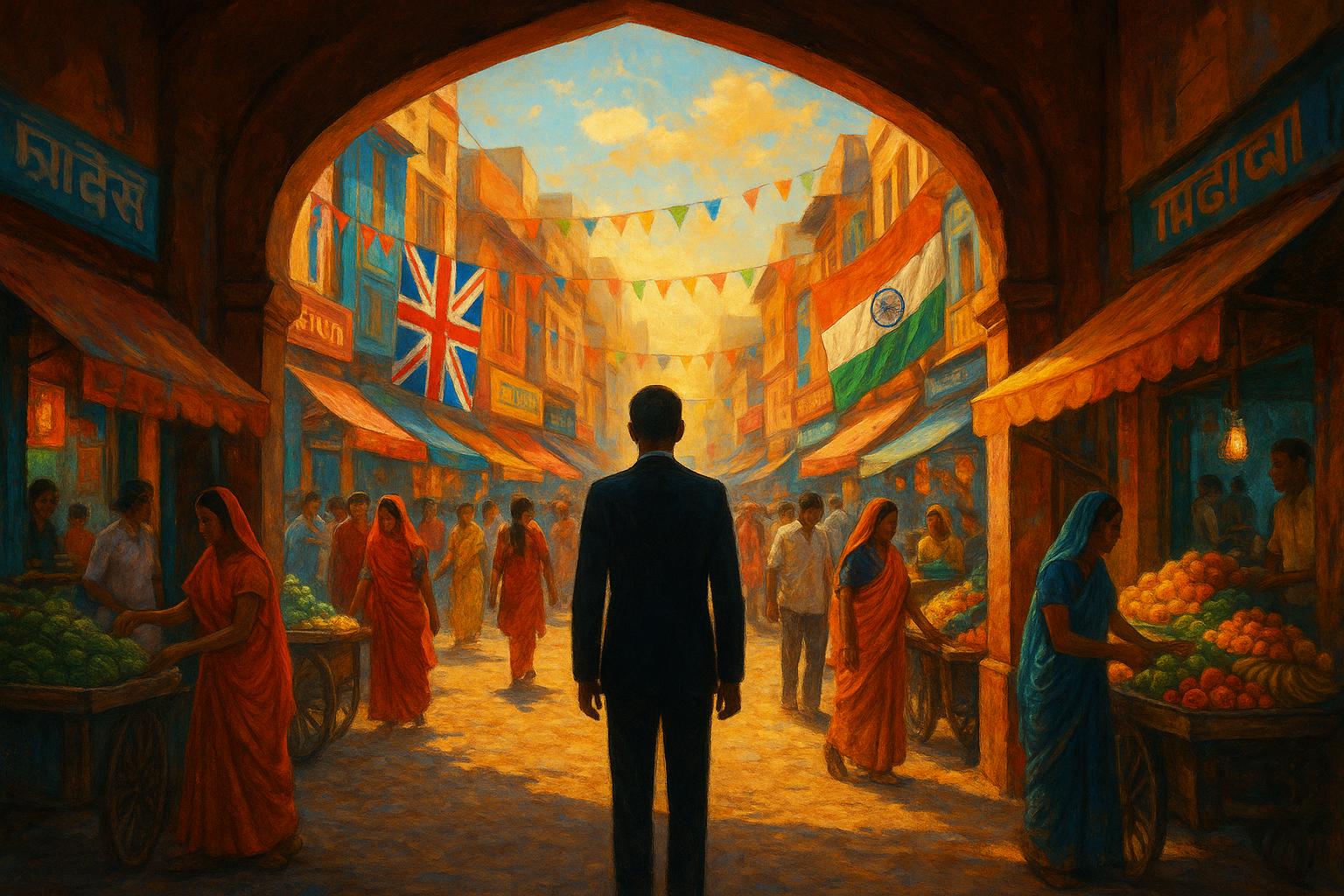British Prime Minister Keir Starmer’s recent visit to India marks a significant milestone in UK-India relations as he spearheads the largest-ever British trade delegation to the country. Arriving in Mumbai with a delegation of over 100 business, academic, and cultural leaders, Starmer delivered a unique in-flight message from the cockpit, setting an ambitious, hands-on tone for the mission. This visit focuses on cementing economic ties through advancing the UK-India Free Trade Agreement (FTA), which was finalised in July 2025 after three years of negotiations.
The trade deal represents a comprehensive effort to deepen bilateral economic engagement, reducing tariffs on key products such as textiles, whisky, and cars, while offering enhanced market access for companies from both nations. According to official projections, this agreement is expected to boost trade between the UK and India by £25.5 billion by 2040. The agreement also fosters cooperation in advanced manufacturing, digital trade, clean energy, and services—industries viewed as critical for future growth. Starmer, highlighting India’s rise as a global economic power expected to become the world’s third-largest economy by 2028, underscored that the pact serves as a catalyst for post-Brexit economic expansion. He was welcomed in Mumbai by Maharashtra’s Chief Minister and other senior officials, reflecting the high stakes and mutual interest in the partnership.
During his visit, Starmer held a pivotal meeting with Indian Prime Minister Narendra Modi, reinforcing ongoing collaboration through the recently launched technology security partnership and the trade agreement. This meeting was not only a diplomatic formality but also a platform to announce significant developments, including £1.3 billion in new investments from 64 Indian companies into the UK. Such investments are poised to bolster sectors including advanced manufacturing and digital trade, further enmeshing both economies. However, political differences persist; for instance, Modi’s recent birthday greeting to Vladimir Putin contrasts with the UK’s stance on Russia, though officials from both sides emphasise that these divergences do not impede their economic cooperation. Starmer’s efforts to build rapport with Modi appear instrumental in advancing shared economic goals.
While the trade mission focused heavily on economic gains and business opportunities, Starmer was unequivocal in stating that the FTA does not alter the UK's visa regime for Indian nationals. Addressing widespread public speculation, he clarified that the free trade agreement does not include visa concessions, particularly for Indian tech professionals, despite the importance of attracting global talent to the UK. This position aligns with Labour’s broader immigration stance, which remains cautious and seeks to link visa policies with deportation agreements. Starmer described the issue as largely settled with India, given an existing deportation accord, and termed visa discussions a “non-issue” in this context. This pragmatic approach avoids complicating trade negotiations while maintaining focus on commerce and investment growth.
Starmer’s visit also illuminated cultural and creative industry collaborations. Notably, he announced that three Bollywood films will be produced in the UK starting in early 2026, marking the return of Yash Raj Films to British shores after an eight-year hiatus. This initiative is expected to generate approximately 3,000 jobs and symbolises the type of cross-sector partnerships that the UK-India trade deal aims to promote. It highlights the broad scope of the trade mission, extending beyond traditional commerce into film and cultural industries, thus cementing the UK’s status as a premier destination for international business and creativity.
The comprehensive trade pact and the UK’s concerted efforts to deepen ties with India come amid shifting global trade dynamics influenced by international tariff tensions and geopolitical changes. The deal, conceived partly in response to uncertainties caused by US tariffs under the previous administration, positions both the UK and India to benefit from greater market access and joint innovation in key future-focused sectors. The mission also coincides with practical measures to enhance connectivity, such as British Airways expanding flights to Delhi and the launch of a new Manchester to IndiGo route, facilitating smoother movement for business and people.
In sum, Starmer’s strategic leadership in this historic trade mission underscores a new chapter in UK-India relations. By driving the swift implementation of the FTA, fostering technological and industrial collaboration, and promoting cultural ties, the UK seeks to unlock significant economic potential. While visa issues remain set aside, the focus on trade, investment, and job creation aligns with the UK’s broader economic priorities and political considerations. This visit not only consolidates a key bilateral partnership but also signals Britain’s ambitions to strengthen its global economic footprint in a rapidly evolving international landscape.
📌 Reference Map:
- Paragraph 1 – [1], [4], [6]
- Paragraph 2 – [4], [7]
- Paragraph 3 – [3], [4], [7]
- Paragraph 4 – [1], [2]
- Paragraph 5 – [1], [5]
- Paragraph 6 – [4], [7]
Source: Noah Wire Services
